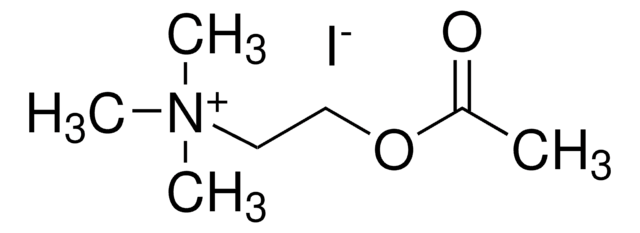C2888
Acetilcolinesterasa from Electrophorus electricus (electric eel)
Type V-S, lyophilized powder, ≥1,000 units/mg protein
Sinónimos:
AChE, Acetil colinesterasa, Acetilcolina acetilhidrolasa
About This Item
Productos recomendados
biological source
Electrophorus electricus
type
Type V-S
form
lyophilized powder
specific activity
≥1,000 units/mg protein
mol wt
280 kDa
composition
Protein, ≥45% biuret
pI
~5.3
solubility
Tris buffer: 1 mg/mL (0.02 M Tris buffer, pH 7.5)
storage temp.
−20°C
¿Está buscando productos similares? Visita Guía de comparación de productos
General description
Punto isoeléctrico: 5,5
Coeficiente de extinción: E1% = 18,0 (280 nm)
La acetilcolinesterasa de Electrophorus electricus es un tetrámero compuesto de 4 subunidades iguales de 70 kDa cada una. Cada subunidad contiene un sitio activo. La enzima es una glucoproteína que contiene hexosaminas.
Application
- in acetylcholinesterase activity assay
- to study its effects on Xenopus embryonic hippocampal cells
- to study the effect of acetylcholine inhibitors on development and plasticity
Biochem/physiol Actions
Caution
Unit Definition
Physical form
Analysis Note
Storage Class
11 - Combustible Solids
wgk_germany
WGK 3
flash_point_f
Not applicable
flash_point_c
Not applicable
ppe
Eyeshields, Gloves, type N95 (US)
Certificados de análisis (COA)
Busque Certificados de análisis (COA) introduciendo el número de lote del producto. Los números de lote se encuentran en la etiqueta del producto después de las palabras «Lot» o «Batch»
¿Ya tiene este producto?
Encuentre la documentación para los productos que ha comprado recientemente en la Biblioteca de documentos.
Los clientes también vieron
Nuestro equipo de científicos tiene experiencia en todas las áreas de investigación: Ciencias de la vida, Ciencia de los materiales, Síntesis química, Cromatografía, Analítica y muchas otras.
Póngase en contacto con el Servicio técnico








